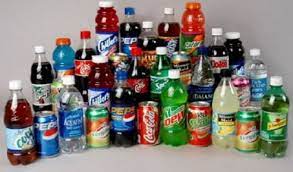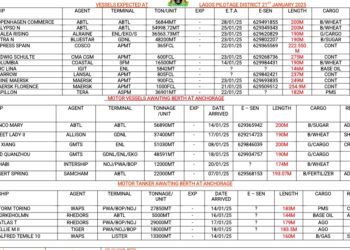Yinka Onigbinde (with Agency Report)
The Manufacturers Association of Nigeria (MAN), as well as economic experts have warned that the new tax imposed on carbonated drinks would be counter-productive.
MAN had commissioned a report detailing the effects of reintroducing excise duty on carbonated drinks and warned that it would be counterproductive and lead to revenue loss for the government following the Federal Government introduction of excise duty of N10 per litre on all non-alcoholic, carbonated and sweetened beverages.

The Minister of Finance, Budget and National Planning, Zainab Ahmed had announced the new excise duty during the public presentation of the 2022 budget on Wednesday in Abuja.
According to her, the new policy introduced is in the Finance Act signed into law by President Muhammadu Buhari on December 31, 2021.
She said, “there’s now an excise duty of N10 per litre imposed on all non-alcoholic and sweetened beverages. And this is to discourage excessive consumption of sugar in beverages which contributes to a number of health conditions including diabetes and obesity. But it is also used to raise excise duties and revenues for health-related and other critical expenditures. This is in line also with the 2022 budget priorities.”
According to her, the charge on beverages is a new policy introduced in the Finance Act signed into law by President Muhammadu Buhari on Dec. 31, 2021 alongside the 2022 Appropriation Bill.
Ahmed said the new ‘Sugar Tax’ was introduced to raise excise duties and revenues for health related and other critical expenditures in line with the 2022 budget priorities.
She also said it was aimed at discouraging excessive consumption of sugar in beverages, which contributed to diabetes, obesity and other diseases.
Ahmed added that the Finance Act also raised excise duties and revenues for the health sector.
However, MAN in a report titled ‘key considerations against excise on non-alcoholic beverages’, projected that the government might collect N81bn revenue from excise duty on carbonated drinks between 2022 and 2025, but lose N197bn within the same period from other taxes, such as Value Added Tax and Company Income Tax from the manufacturers of soft drinks.
The report added that introducing excise duty would cause the beverage sub-sector of the food and beverage industry to lose up to N1.9tn in sales revenue between 2022 -2025, due to the imposition of the new taxes with simultaneous adverse effects on jobs and supply chain businesses.
The Director-General of MAN, Segun Ajayi-Kadir, had said “I would like to say that the introduction of excise duty of N10/litre on non-alcoholic, carbonated and sweetened beverages, despite its potential overwhelming negative impact is rather unfortunate.”
He stressed that the excise duty tax would affect the sub-sector, which has contributed significantly to the economy and taxes, despite the debilitating effects of naira devaluation, inadequacy of forex, and the COVID-19 pandemic.
He added that the government’s revenue aspirations might not be realised in the long run.
“The revenue aspirations of the government in introducing this excise may not be justified in the long run. Let us look at it this way. The government is estimated to generate an excise tax of N81bn between 2022-2025 from the group. This will not be sufficient to compensate the corresponding government’s revenue losses in other taxes from the group.”
Ajayi-kadir explained that food and beverages contributed the highest at 38 per cent of the total manufacturing sector quota to the nation’s Gross Domestic Product (GDP).
He added that the sector comprised 22.5 per cent of manufacturing jobs and generated more than 1.5million jobs.
“One is particularly worried about the ripple effect on the introduction of the excise, despite strenuous evidence-based advice to the contrary.
“This will have unpleasant impact on employment, households and consumers.
“As seen from previous impact analysis, excise affects production outputs, revenues and profits.
“This causes companies to pursue cost cutting measures to reduce the effect of diminishing revenue and profits by reducing employee salaries or retrenchment.
“So, this excise would certainly cast a sunset to this performance,” he said.
“For instance, the corresponding effect of reduced industry revenue on government revenues is estimated to be up to N142 billion contraction in Value Added Tax (VAT) raised by the sector and N54 billion Corporate Income Tax reduction between 2022 to 2025.
“This is not to mention the potential negative impact on manufacturers/supply chain.
“Nigeria is the 6th highest consumer of soft drink, but per capita consumption is low.
“Introducing excise will easily reduce production capacity causing manufacturers to struggle to meet investor commitments as well as cause investor to take investments to other countries.
“A decrease in production levels or ability to purchase raw materials as a result of the introduction of excise tax will result in reduced profits for the supply chain players in the non-alcoholic beverage sector.
“What is not realized by many is that excise begets high production costs which in turn adversely affect production levels and intimately results in dwindling profits.
Read Also: FG Blames Seaport Congestion On Absence Of Dry Ports
“This will grossly impact the small and emerging business owners in the non-alcoholic beverage sector,” he said.
He also said the move might lead to employee salary reduction, retrenchment, and general increase in prices of goods.
This, he said, might put the products out of the reach of the poor segments.
Also, the Fiscal Policy Partner and Africa Tax Leader at PwC, Mr Taiwo Oyedele, expressed concerns over the effects of the development on the manufacturing sector.
He said, “I will be more concerned about sectors like manufacturing because their cost is rising and they are not able to increase their selling prices because the purchasing power is low.
“If you impose a tax, because they want to survive, they have to cut down on employment and find a way to survive. In terms of inflation, when you impose maybe an excise tax, if the sector is able to pass it on to customers, it would be higher selling prices, leading to inflation.
“But if the products are very elastic, and you are afraid of losing the market, then you bear the costs and your margins will be low. If your margin is low, it means what you pay in company income tax will be less, and your shareholders will get less in dividends, affecting their own purchasing power as well. So, taxes, sometimes, have unintended consequences, which policymakers must always consider.”
Kindly like us on Facebook
















Discussion about this post